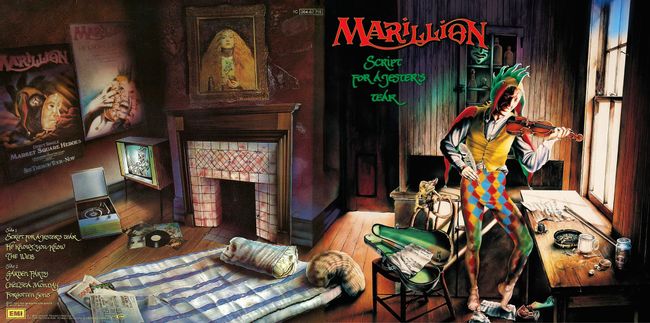The Band’s Origins:
Marillion formed in 1979 in Aylesbury, Buckinhamshire, England. By the time of the neo-progressive rock band’s first officially released recordings in 1982, only drummer Mick Pointer and guitarist Steve Rothery remained from the original lineup. Fish had joined as the leader singer and lyricist, Mark Kelly as keyboardist, and Pete Trewavas as bassist. This lineup released the October 1982 single “Market Square Heroes” in October 1982 and, in March 1983, Script for a Jester’s Tear, “a landmark debut album that would give prog a much-needed shot in the arm.” DE
At the Neo-Progressive Rock Forefront
The myth that punk rock killed prog has been overstated; the genre “was doing a job of killing itself. Its founding fathers had either imploded (Yes, ELP), streamlined their sound so much as to be virtually unrecognizable (Genesis, Rush), or faded into commercial irrelevance (Caravan, Camel).” DE Marillion was “regarded as the pre-eminent force of this neo prog movement,” MD a banner Fish wasn’t excited to hoist. “I never saw us as being champions of anything…We were just doing what we did.” DE As Trewavas said, “We weren’t necessarily a rock band, we certainly weren’t a pop band. But we were selling out clubs like the Marquee, and we had quite a fan base.” DE They weren’t the first of their kind, “but they were certainly the most successful, and arguably the most important.” DE
Detractors have accused Marillion of copying early Genesis when they were fronted by Peter Gabriel, a comparison not without merit considering both band’s tendencies toward complicated imagery and dramatic flair, not to mention the theatrical stage presences of their frontmen.
Regarding the musical similarities, Fish said, “I look back on it now and a lot of those criticisms were justified. I mean, ‘Grendel’ [the 17-minute epic featured on the ‘Market Square Heroes’] was ‘Supper’s Ready’ [a nearly 23-minute song from Genesis’ 1972 Foxtrot album]. We were holding onto the skirts of our influences, trying to find the confidence to break away from it.” DE “Mark Kelly’s keyboard textures and Steve Rothery’s restless guitar work” DE also “paid lip service to their influences.” sup>DE Even so, “this was new music for a new decade” DE as Marillion reignited interest in progressive rock.
About the Album
In Jon Collins’ book Separated Out, he describes the album as “ambitious, varied, moody, dramatic, lyrical, accomplished.” JC-39 The songs “recounted a series of stories relating to a character in a particular situation…Though never mentioned explicitly, the character was the jester, representing the hedonistic alter-ego of Derek Dick,” JC-39 i.e. Fish. The character of the crying jester would serve as the inspiration for the album title and its artwork.
A large part of the band’s appeal was due to Fish, who Rothery called “a very forceful frontperson.” DE The songs on the album completely satisfy as Fish’s poetic and introspective lyrics require repeat listening to completely absorb. Fish always has something to say and is never at a loss for a clever way to do so.
Musically, it sounds like the rest of the band shuffled through instrumental bits and pieces until they found suitable background noise to accommodate whatever Fish retrieved from what one guesses is a vast collection of journals and diaries. That isn’t to say that the music doesn’t adequately complement the lyrics (the title track exemplifies how the music can enhance the drama of the vocals), just that neither appears to have been crafted with the other in mind.
“Script for a Jester’s Tear”
Every song on the album except the title cut had existed in some form for at least a year. Fish wrote the song about his first serious relationship and, as he said, “all the questions and issues that brought with it. There was a lot of introspection going on in the lyrics.” DE “Introspectiion gives way to anger, and frustration boils over as the band soar into a showpiece of Marillion musicianship.” JC-39
Musically, it “started with a piano-led lamentation that then transitioned into a playful, Medieval-styled mid-section that conjured an image of a bustling king’s court. The mood then turned gloomy and dark with marked flourishes of distorted guitar along side lush organ, then bleeding into an epilogue of anthemic guitar ad-lib as well as glassy chimes and bells.” CR
The song owed its origins to “The Crying Jester,” the first song Fish ever wrote. That was “a total rip-off of a Jon Anderson song…written on the night that Keith Moon died: he was…the crying jester.” JC-39
“He Knows You Know”
This “rockin’ stomper” CR was the first single and the only cut on the album to come in under seven minutes. Lyrically, it “sweated junkie paranoia from its every pore” DE while musically it was “vibing off something more sinister and metallic, courtesy of the scathing guitar as well as punchy bassline.” CR
Fish explained that the song was “about someone who went from nervous exhaustion, through depression then full-scale drug abuse.” JC-39 It was inspired by his own excesses as well as a friend’s. JC-39
“The Web”
On this “nine-minute, textured epic,” CR “Fish’s lyrics veered between rage, frustration, and heartbreak.” DE “With its spider-like guitar plucks, keyboard melodies, and heat-of-the-moment guitar interlude” CR this “was a prog bedsit anthem.” DE
The song was one of the band’s oldest, starting life as an instrumental. Fish took some of the lyrical inspiration from Penelope, wife of Odysseus. She said she’d choose a new husband after finishing a death shroud for Odysseus. To stall, she would undo her work each night. JC-39
“Garden Party”
The second single from the album “showcases Marillion at the peak of its powers.” JF Fish lashes out at the cultural elite with phrases like “smiles polluted with false charm” and “social climbers polish ladders, wayward sons again have fathers.” “It was the anti-Brideshead Revisited; a furious, sarcastic class-war anthem that punched and jabbed like a Muirhouse street fighter.” DE
“Here, the influence of Rush was very apparent, especially in Fish’s vocal timbre and phrasing that recalled that of Geddy Lee, as well as the rhythm section’s symphonic shots and overall structure.” CR Fish once commented, “it’s our most Genesis-y song!” JC-40
“Chelsea Monday”
This “was initially a bit bluesy and starry, then breaking into a stellar mid-song guitar-led instrumental interlude, and ending in a piano coda.” CR
Fish was inspired to write this “tale of a doomed rich girl” DE because of a newspaper headline he read on “one of the amphetamine-fuelled early morning walks through London he had taken to going on.” DE He said it was about “a female character drowning in romanticism, unable to cope with reality.” JC-40
“Forgotten Sons”
This song “concludes the opus magnificently.” JF Fish attacks warmongers “who order desecration, mutilation, verbal masturbation in their guarded bureaucratic wombs.” It “was ostensibly a protest song about the situation in Northern Ireland, though it could be read as a furious critique of the Thatcher government.” DE Fish said it was “about government manipulation” and how his cousin got injured during a riot. JC-40
Musically, it displays “vestiges of the band’s Punk and Post-Punk beginnings; then proceeded to the mid-section in a gracefully flowing rhythm; and ultimately, wrapped up the entire jester’s show with the majestic Yes/ELP/Styx-reminiscent, horn-adorned denouement.” CR
Notes:
A reissue includes a second disc with a demo of “He Knows You Know,” an alternate version of “Chelsea Monday,” and non-album tracks “Market Square Heroes” (two versions), “Three Boats Down from the Candy,” “Grendel,” and “Charting the Single.”
| 











